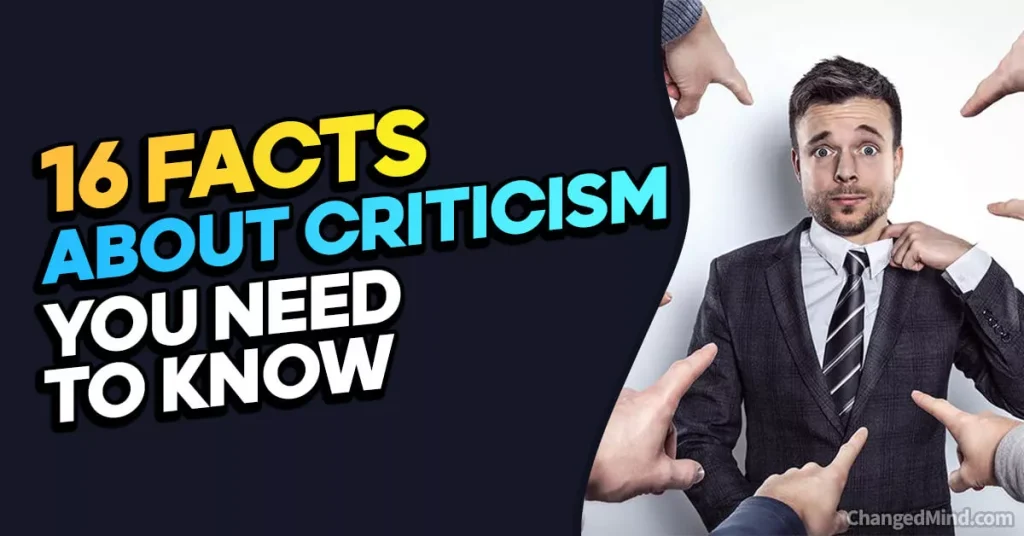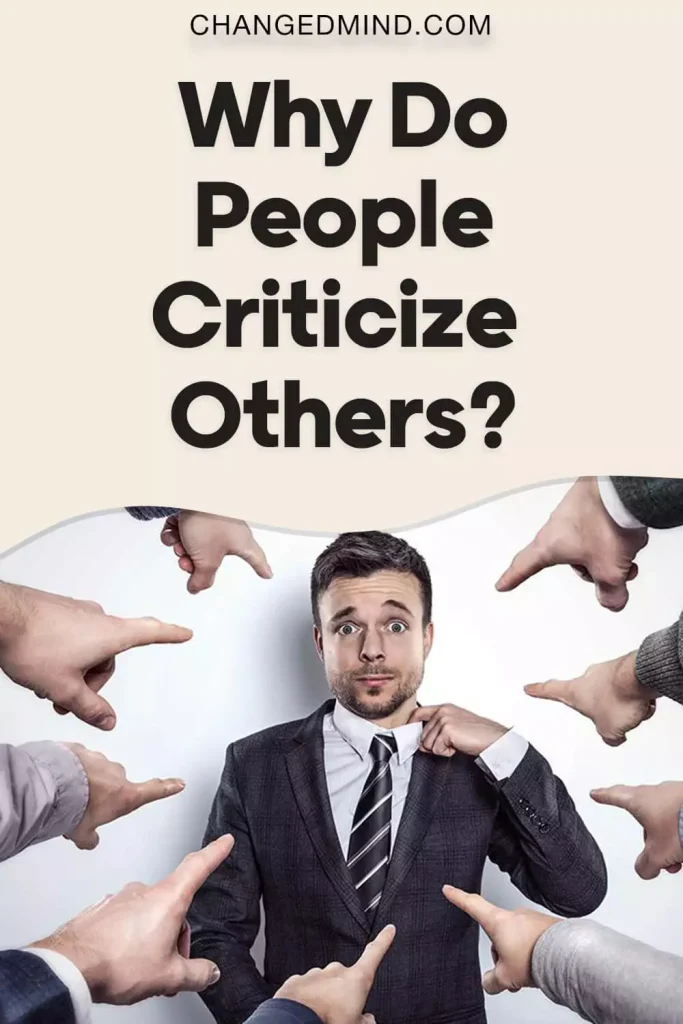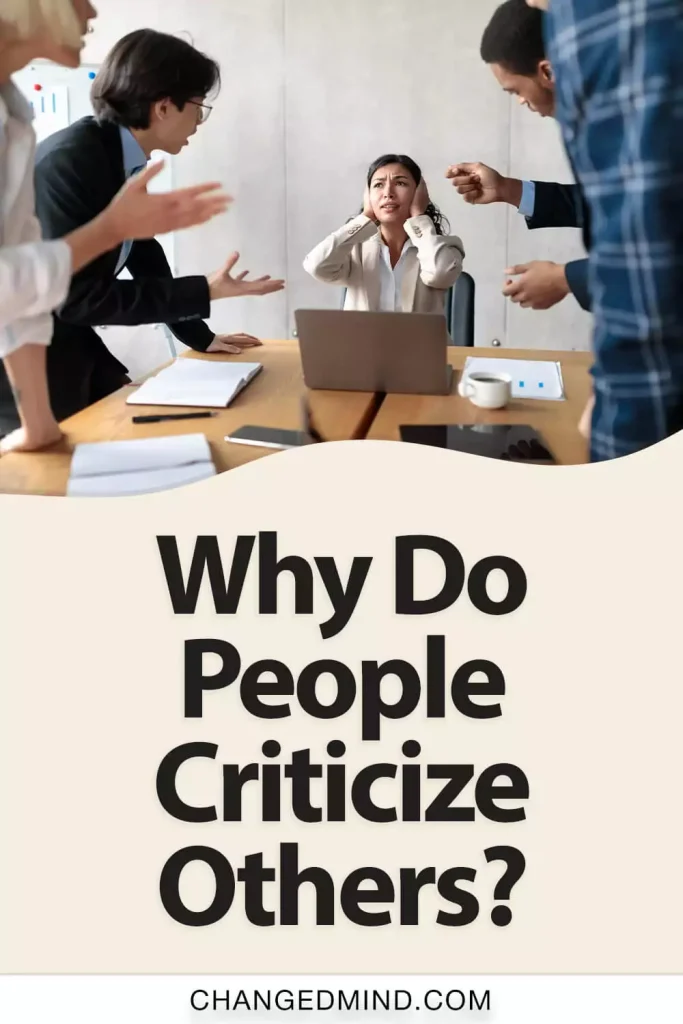Ever wondered why Aunt Karen can’t resist commenting on your new hairstyle at family gatherings? 🤔 Brace yourself, because we’re diving into the intriguing world of criticism!
So, why do people criticize others. In a nutshell, it’s a complex cocktail of psychology, social dynamics, and, well, some good ol’ human quirks.
In this article, we’ll spill the beans on seven fascinating facts about criticism that will not only explain Aunt Karen but also provide insights into this universal behavior.
In this article, we’ll unravel:
- The evolutionary roots of criticism
- How culture shapes our critical tendencies
- The psychology behind constructive vs. destructive criticism
- Ways to handle criticism gracefully
- The surprising benefits of being on the receiving end
- And more! So, grab your thinking cap and let’s decode the art of critique! 🕵️♂️📚
Criticism is a common occurrence in our daily lives, but have you ever wondered why people criticize others? In this article, we will delve into the reasons behind people’s tendency to criticize and the impact it can have on individuals and relationships. Understanding the underlying motivations behind criticism can provide valuable insights into human behavior.
Criticism can be defined as the act of expressing disapproval or judgment towards someone’s thoughts, actions, or behavior. It can take various forms, from constructive feedback to harsh and malicious comments. To understand criticism better, we need to explore the reasons why people engage in this behavior.
There are several motivations that drive individuals to criticize others. Insecurity and jealousy are common drivers, as some people may criticize others as a way to boost their own self-esteem or maintain a sense of superiority. Different perspectives and values can also lead to criticism, as people may express disapproval towards those who hold different beliefs or behave differently.

Past experiences and trauma can shape a person’s critical behavior, as unresolved emotions or negative experiences may lead them to project their pain onto others. Cultural and social influences play a role in shaping people’s attitudes towards criticism and how they express it.
The impact of criticism can be significant, both on the individual receiving the criticism and on the dynamics of relationships. Emotionally, criticism can erode self-confidence, create feelings of inadequacy, and contribute to anxiety or depression. In relationships, repeated criticism can strain bonds, create resentment, and diminish trust and communication.
Several factors influence how individuals respond to criticism. It is crucial to reflect on the criticism received and evaluate its source. Understanding the intent and credibility of the critic can help determine how to approach and interpret the criticism.
Responding constructively by considering the validity of the feedback and addressing it in a respectful manner can lead to personal growth and improved relationships. Seeking support from trusted individuals can also provide guidance and encouragement during challenging times.
In this article, we will explore the multifaceted nature of criticism, the motivations behind it, its impact on individuals and relationships, and how to respond constructively when faced with criticism.
By gaining a deeper understanding of criticism, we can navigate this aspect of human interaction more effectively and foster healthier connections with others.
Key takeaway:
- Criticism is a common human behavior: Understanding criticism helps us realize that it is a part of human nature to criticize others.
- Motivations behind criticism: People may criticize others due to their own insecurities, jealousy, different perspectives, values, past experiences, trauma, or cultural and social influences.
- Effects of criticism: Criticism can have emotional and relationship impacts, causing feelings of negativity and strain in relationships.
What is Criticism?
Criticism is the act of expressing disapproval or judgment. It involves evaluating someone or something and providing feedback based on personal opinions or standards. Criticism can be both positive and negative.

Criticism evaluates the merits or flaws of a subject objectively, allowing for a fair assessment. It also provides suggestions for improvement or focuses on negative aspects without offering helpful input.
Criticism is often influenced by personal beliefs, experiences, or cultural background, shaping the perspective from which it is given.
Common motivations for criticism can include asserting power, feeling jealous or insecure, or genuinely caring about others’ well-being.
Criticism can have various impacts on individuals, ranging from causing sadness, anger, or demotivation, to fostering personal growth and development.
In relationships, constantly being subjected to criticism can strain them, while constructive criticism can foster trust, growth, and understanding.
When facing criticism, it is important to evaluate its validity and consider different perspectives. It is also crucial to assess the credibility and relevance of the source offering the criticism. Instead of becoming defensive, it is advisable to respond constructively. Seeking support from trusted individuals can also be beneficial in dealing with criticism.
Understanding Criticism: Because everyone’s a critic, but not everyone knows how to take it.
16 Facts About Criticism You Need to Know

Here are 16 facts about criticism that provide valuable insights into this common human behavior:
- It’s Innate: Humans have been criticizing each other since the dawn of time—it’s part of our social nature.
- Feedback Mechanism: Criticism can serve as a feedback loop for self-improvement.
- Constructive vs. Destructive: Criticism can be either helpful (constructive) or harmful (destructive).
- Cultural Influence: Cultural norms influence how criticism is expressed and received.
- Subjectivity: Criticism is highly subjective, often based on personal opinions and biases.
- Emotional Impact: Negative criticism can hurt, affecting self-esteem and emotional well-being.
- Communication Tool: Criticism can be a tool for communication, used to express concerns or dissatisfaction.
- Intent Matters: Understanding the intent behind criticism is crucial for its interpretation.
- Defensive Reactions: People often respond defensively to criticism, hindering productive dialogue.
- Growth Opportunity: Embracing constructive criticism can lead to personal and professional growth.
- Criticism vs. Feedback: Feedback focuses on behavior, while criticism often targets personal attributes.
- Jealousy and Competition: Criticism may stem from jealousy or competition in various contexts.
- Social Comparison: We often criticize to assess ourselves in relation to others.
- Public vs. Private: Public criticism can have a more significant impact than private critiques.
- Balancing Act: Offering criticism with empathy and respect is a delicate balance.
- Empowerment: Learning to handle criticism can empower individuals to use it for self-improvement.
Understanding these facts about criticism can help individuals navigate its complexities, both as givers and receivers, fostering better communication and personal development.
Understanding Criticism

Understanding criticism is crucial for personal growth, fostering healthy relationships, and improving skills. Here are key points to consider:
- Criticism as feedback: View criticism as valuable feedback, not a personal attack. Understand that criticism highlights areas for improvement, approach it with an open mind, and be willing to learn.
- Objective evaluation: Effective criticism is based on objective evaluation, not personal bias. Focus on specific behaviors or actions instead of attacking character or identity. This allows for a more constructive conversation.
- Multiple perspectives: Embrace different perspectives to enhance understanding. When receiving criticism, consider the viewpoint of the critic and evaluate the validity of their concerns. This avoids a narrow-minded approach and encourages growth.
- Constructive communication: Effective criticism involves clear and respectful communication. Both the giver and receiver of criticism should maintain open lines of communication, actively listen to each other’s viewpoints, and engage in productive dialogue. This facilitates a better understanding of the critique and promotes growth.
- Self-reflection: Understanding criticism requires self-reflection. Take a step back and objectively analyze actions and behaviors. Identify areas for improvement, acknowledge mistakes, and take responsibility.
- Learning opportunity: Embrace criticism as a chance to expand knowledge, enhance skills, and cultivate personal and professional growth. View it as a learning opportunity rather than becoming defensive.
- Balancing feedback: Strike a balance between accepting and processing criticism, while also valuing self-worth. Be selective in absorbing and integrating criticisms into life, ensuring alignment with values and goals.
Understanding criticism is a skill that requires practice and self-awareness. When approached with a growth mindset, criticism can serve as a powerful tool for personal development and fostering strong relationships.
Why Do People Criticize Others?
People criticize others for various reasons: insecurity, jealousy, different perspectives and values, past experiences and trauma, and cultural and social influences. Understanding these motivations can shed light on why people engage in criticism. So why do people criticize others?
One common reason is insecurity and jealousy. People may criticize others to mask their own insecurities and boost their self-esteem. They may feel threatened by someone’s success, appearance, or abilities, leading them to belittle or demean the individual.
Another reason is different perspectives and values. Criticism can arise when individuals clash due to their differing viewpoints, beliefs, and values. One person may criticize another’s actions or choices that go against their own principles or cultural norms.
Past experiences and trauma can also influence criticism. Negative personal experiences can shape how individuals perceive and interact with others. Those who have been hurt or traumatized may project their pain onto others, leading to criticism as a form of defense or control.
Cultural and social influences play a role in criticism. Society and culture shape behavior and expectations. People may criticize others based on societal norms, pressure to conform, or social judgments. They adhere to certain standards or expectations, and any deviation from those can result in criticism.
Understanding the reasons behind criticism can help individuals navigate and respond effectively. It’s important to reflect on the criticism, considering the source and motivations. Evaluating the intent behind the criticism can determine if it is constructive or simply intended to hurt. Responding constructively and seeking support can also help individuals overcome the effects of criticism.
Ultimately, recognizing the underlying factors behind criticism provides insight into human behavior and facilitates healthier interactions. By fostering empathy and understanding, individuals can build stronger relationships and cultivate a more compassionate society.
Behind every criticism lies a hidden motive, like a cloak of insecurity or a mask of jealousy.
Common Motivations Behind Criticism
Criticism occurs frequently in our daily lives, and understanding its motivations can help us respond effectively. Here are the common motivations behind criticism:
The Impact of Criticism
Criticism can truly shape the dynamic of our interactions, affecting us on multiple levels. In this section, we’ll uncover the far-reaching impact criticism has on our lives.
From the emotional turmoil it can create to the strain it puts on our relationships, we’ll explore the various consequences that arise from this often-debilitating judgment. Prepare to delve into the intricate world of criticism and its profound effects.
Emotional Effects of Criticism
The impact of criticism on our well-being and mental state can be significant. Here are some key emotional effects to consider:
1. Hurt feelings: Criticism can cause emotional pain and lower self-esteem.
2. Anger and defensiveness: Criticism can provoke anger and frustration as we try to protect our ego.
3. Anxiety and stress: Criticism can increase anxiety and stress levels, affecting our mental well-being.
4. Self-doubt and insecurity: Frequent criticism can erode confidence and lead to feelings of insecurity.
5. Avoidance and withdrawal: Constant criticism may cause individuals to avoid situations and withdraw from social interactions, hindering personal growth.
It’s important to recognize that not all criticism is meant to harm or belittle. Constructive criticism can be beneficial for personal growth. It’s crucial to be aware of the emotional effects and manage them effectively.
Fact: Studies indicate that receiving criticism activates the same areas of the brain associated with physical pain, highlighting its emotional impact.
Relationships can crumble under the weight of criticism, proving that the pen can be mightier than the heart.
Relationship Effects of Criticism
The effects of criticism on relationships can significantly impact interpersonal dynamics. Consider the following key effects:
1. Strained Relationships: Constant or harsh criticism can strain relationships, leading to resentment, animosity, and distance between partners, friends, colleagues, or family members.
2. Communication Breakdown: When criticism is not handled constructively, it can cause a breakdown in communication. Negative feedback can make individuals defensive and unwilling to listen, hindering effective communication and understanding.
3. Decreased Trust: Critical remarks erode trust between individuals. Consistent judgment or attacks can diminish trust and make someone feel vulnerable in the relationship.
4. Emotional Distance: Frequent criticism may lead to emotional distancing. The receiver of criticism might disconnect emotionally to protect themselves, resulting in a lack of emotional intimacy.
5. Lowered Self-Esteem: Criticism can harm an individual’s self-esteem. Constant negative feedback can create doubt about abilities, worth, and value, impacting confidence in the relationship.
6. Resentment and Anger: Unaddressed criticism can breed resentment and anger. Consistent targeting or belittling can lead to a buildup of negative emotions that may explode in conflicts.
7. Avoidance and Withdrawal: Criticism can cause individuals to avoid confrontation or withdraw from the relationship altogether. This contributes to a breakdown in communication and further distance between the parties involved.
A Sarah and John had been together for years, but John’s habit of criticizing Sarah’s choices and actions began to strain their relationship. Sarah felt unheard, unappreciated, and defensive whenever John offered feedback. Their communication became strained, and they started avoiding important topics altogether. This led to emotional distance, with both feeling resentful and misunderstood. Eventually, Sarah sought the help of a relationship counselor who addressed the effects of criticism. Through open and honest dialogue, they learned to communicate their needs effectively. John worked on offering constructive feedback, while Sarah practiced active listening and sharing her emotions. As they rebuilt trust and understanding, their relationship transformed into a stronger, more supportive, and fulfilling one.
Factors Influencing Criticism
Criticism is a complex phenomenon, influenced by a multitude of factors that shape our thoughts and opinions. In this section, we’ll dive into the various factors that can impact criticism. From insecurity and jealousy to different perspectives and values, past experiences and trauma, and cultural and social influences, we’ll explore the intricate web of factors that contribute to why people criticize others.
Get ready to uncover the fascinating dynamics behind criticism and gain a deeper understanding of this common human behavior.
1. Insecurity and Jealousy
Insecurity and jealousy are common factors that contribute to people criticizing others. When individuals experience feelings of insecurity or jealousy, they may project those emotions onto others and amplify perceived flaws or weaknesses. This can create a strong inclination to criticize and undermine others.
Jealousy often arises when someone feels threatened by the success, achievements, or qualities of another person. It originates from a deep-seated fear of being inferior. Insecure individuals criticize others as a way to protect their fragile self-esteem and downplay the accomplishments or strengths of others.
Insecurity and jealousy can manifest in various forms, such as making derogatory comments, spreading rumors, or resorting to passive-aggressive behavior. The criticism may target a person’s appearance, intelligence, abilities, or personal choices.
Addressing insecurity and jealousy within oneself is crucial. It is equally important for recipients of criticism to understand that it often reveals more about the person giving it. Recognizing that criticism stems from the insecurities and jealousies of others can help individuals cope and respond in a healthier manner.
When faced with criticism rooted in insecurity and jealousy, it is important to reflect on the situation. Assess the source and consider whether the criticism is genuinely constructive or merely an attempt to bring you down. Responding in a constructive and assertive manner can be beneficial, and seeking support from trusted friends or professionals may also be helpful, if necessary.
Different Perspectives and Values: When it comes to criticism, it’s like a game of ‘this-is-wrong’ vs ‘no-it’s-not,’ with no referee in sight.
2. Different Perspectives and Values
Different Perspectives and Values significantly influence criticism. People’s viewpoints and beliefs shape how they perceive and evaluate others’ actions. Understanding this aspect is essential when analyzing criticism and its impact on individuals and relationships.
To illustrate the impact of Different Perspectives and Values, consider a scenario involving two coworkers, Alex and Sarah. Alex values precision and accuracy, while Sarah values flexibility and thinking outside the box.
In a team project, Alex criticizes Sarah’s approach because it lacks structure and organization. Sarah, however, sees her approach as a way to encourage creativity. Both Alex and Sarah are trying to achieve the best outcome, but their differing perspectives lead to a clash of ideas.
In this situation, understanding the influence of Different Perspectives and Values is crucial for effectively managing criticism. Sarah can reflect on Alex’s feedback and consider it from their perspective. Similarly, Alex can try to understand Sarah’s approach and recognize its value. By acknowledging and respecting each other’s perspectives, they can find a middle ground and enhance their collaboration.
Ultimately, Different Perspectives and Values shape criticism and how it is received. By recognizing and appreciating these differences, individuals can foster understanding and empathy. This leads to more constructive and respectful interactions, allowing for growth and development.
3. Past Experiences and Trauma
Past experiences and trauma significantly influence why people criticize others. These experiences shape perspectives and behavior towards others. Key factors to consider are as follows:
- Emotional scars: Individuals with past experiences or trauma may criticize as a defense mechanism, projecting pain onto others.
- Personal triggers: Certain experiences trigger negative emotions or memories, leading to criticism, like childhood abuse or emotional neglect.
- Learned behavior: People mimic observed behaviors, adopting criticism as a way to communicate or exert control.
- Coping mechanism: Criticizing provides a temporary sense of power or control, especially for those who felt powerless in the past, helping them regain strength.
It is important to note that not everyone who has experienced trauma engages in criticism. Each individual copes differently, influenced by resilience, support systems, and personal growth. These factors determine whether a person criticizes or seeks alternative ways of expression.
Understanding the role of past experiences and trauma in criticism fosters empathy and compassion. Recognizing these factors helps approach criticism objectively and empathetically, promoting healthier interactions and relationships.
Be careful who you criticize, they might write an article about it… and make you famous!
4. Cultural and Social Influences
Cultural norms significantly impact how criticism is expressed. Different cultures possess distinct beliefs and values, resulting in varying approaches to criticism. While some cultures embrace and even promote direct and straightforward criticism, others prefer subtlety and indirectness. Recognizing the cultural context is essential in understanding and appropriately responding to criticism.
The influence of social media platforms has greatly shaped the giving and receiving of criticism. Online platforms provide an easy avenue for individuals to criticize others, sometimes leading to online bullying and negative comments. The impact of criticism is amplified on social media as it reaches a large audience and affects an individual’s reputation.
Peer pressure within specific social groups can also affect the way criticism is employed. Criticizing others can serve as a means to gain acceptance or elevate one’s status. Consequently, individuals may be influenced to join in criticizing others, even if they do not genuinely agree with or believe in the criticism. This creates a toxic environment where criticism is utilized to assert power or conform.
Stereotypes and prejudices also play a role in directing criticism towards certain individuals or groups. Biased criticism based on race, gender, or socioeconomic status is fundamentally unjust. It is crucial to be cognizant of these biases and challenge them when encountering or giving criticism.
Cultural and social influences are significant factors in shaping how criticism is expressed and received. Understanding these influences is essential in navigating criticism mindfully and constructively. By considering the cultural context, the impact of social media, the influence of peer pressure, and the biases ingrained in stereotypes and prejudices, individuals can effectively handle criticism.
Fun Fact: Research indicates that cultural and social influences also impact how individuals perceive and respond to criticism. For instance, collectivist cultures prioritize group harmony and view criticism as a means to enhance social relationships. In contrast, individualistic cultures may perceive criticism as a threat to personal autonomy and self-esteem. This highlights the intricate interplay between culture, social dynamics, and the perception of criticism.
Responding to Criticism: Because self-destruction is so last season, let’s see how we can handle those haters like true bosses.
Responding to Criticism
When faced with criticism, how do we respond? In this section, we’ll explore the art of handling criticism in a constructive manner. We’ll delve into techniques such as reflecting on the criticism, evaluating its source, and responding with grace. We’ll discuss the importance of seeking support during challenging times. So, let’s dive in and learn how to navigate the sea of criticism with resilience and wisdom.
1. Reflect on the Criticism
Reflecting on criticism is crucial for effectively dealing with it. When faced with criticism, it is important to step back and objectively assess the validity and intent. It is natural to feel defensive or hurt when criticized, so take a moment to acknowledge and validate these emotions before engaging with the feedback.
Carefully evaluate the critique, considering its substance and determining if it is constructive, well-intentioned, and supported by evidence or merely baseless and driven by personal biases.
Use criticism as an opportunity for growth. Reflect on the feedback’s truth or merit and consider how it can enhance your skills or behavior. Seek different perspectives to foster self-reflection, as alternative viewpoints can reveal blind spots or areas for development. Consider the source of the criticism. Assess the credibility and expertise of the critic, taking into account their intentions and motivations, as they can greatly influence how the feedback is perceived and integrated.
Learn from your mistakes. If the criticism is valid, accept responsibility for missteps and use them as learning opportunities. Understanding and learning from mistakes contribute to personal and professional growth. Instead of reacting defensively or dismissively, respond to criticism constructively and professionally. Clarify any misunderstandings, address valid points, and express gratitude for the feedback.
When criticism becomes challenging or emotionally distressing, seeking support from trusted individuals for guidance and assistance is essential. Reflecting on criticism allows for personal and professional growth, empowers you to differentiate between constructive feedback and baseless criticism, and facilitates your development.
2. Evaluate the Source of Criticism
When receiving criticism, it’s important to assess its validity and relevance. Consider the following factors when evaluating the source of criticism:
1. Expertise: Evaluate the knowledge and expertise of the critic. Are they qualified to critique in that particular area? For example, if someone without any art experience criticizes your painting skills, their opinion may be less valuable.
2. Motives: Consider the intentions behind the criticism. Is the criticism given to genuinely help you grow, or is it meant to bring you down? Understanding the motives behind the criticism can help you determine its value.
3. Experience: Look at the critic’s own experiences and challenges. Those who have faced similar situations are more likely to provide constructive feedback.
4. Bias: Be aware of any biases the critic may have. Personal biases can cloud judgment and lead to unfair or inaccurate criticism. Considering the biases of the source can help you understand their perspective better.
5. Track Record: Consider the critic’s history of providing valuable insights. If they have consistently given constructive feedback in the past, their criticism may be worth considering.
Filtering out unhelpful or unwarranted feedback by evaluating the source of criticism allows you to focus on constructive criticism that aids in personal growth and improvement. It’s crucial to assess even valid criticism based on your own values, goals, and beliefs.
Remember that not all criticism is useful or accurate. Trust your own judgment and use the evaluation of the source as a tool to determine which critiques to consider and which to discard.
3. Respond Constructively
When faced with criticism, it is important to respond constructively. Take the time to reflect on the criticism and consider its validity. It’s also essential to evaluate the source of the criticism, determining whether it comes from someone with expertise or simply an opinion. No matter the source, it is crucial to respond calmly and respectfully.
Show appreciation by acknowledging the criticism and thanking the person for sharing their perspective. If necessary, seek support from trusted friends, mentors, or professionals. Responding constructively to criticism is a crucial aspect of personal growth. It enables you to learn, improve your skills, and cultivate positive relationships. Embracing criticism with an open mind allows you to turn it into a valuable tool for self-improvement.
Let me share a true story that emphasizes the impact of responding constructively to criticism. Once, I received feedback from a coworker regarding my presentation skills. Instead of reacting defensively, I took a moment to reflect on the criticism and evaluate its validity. After careful consideration, I realized that my coworker had valid points and areas for improvement.
I responded constructively by expressing gratitude for their feedback and expressing my willingness to work on my presentation skills. I sought support from a mentor who provided me with valuable tips and guidance. By responding constructively, I was able to enhance my presentation skills and ultimately become a more effective communicator.
4. Seek Support
When facing criticism, seeking support is crucial. To effectively deal with criticism, follow these steps:
1. Identify trusted individuals: Reach out to people you trust who have your best interests at heart, such as close friends, family members, or mentors. They can provide emotional support and guidance.
2. Share your feelings: Express how the criticism has affected you emotionally. Discussing your feelings with someone who understands and validates your experiences can bring comfort and reassurance.
3. Seek different perspectives: Gain insight from others by discussing the criticism with them. They may offer alternative viewpoints or help you see things from a different angle, which will aid in better understanding the situation.
4. Consider professional help: If the criticism has negatively impacted your mental well-being, don’t hesitate to seek professional support. Therapists, counselors, or coaches can provide valuable guidance and help you develop coping strategies.
5. Join support groups: Connect with others who have experienced similar criticisms or challenges. Participating in support groups or online communities can provide a sense of belonging and offer practical advice on handling criticism.
Seeking support is essential for navigating the effects of criticism. Reflecting on the criticism and responding constructively is important, but having a support system can give you the necessary encouragement and assistance to grow and move forward.
History shows us the significance of seeking support in overcoming criticism. One example is Rosa Parks, an African American woman who, in 1955, refused to give up her seat to a white passenger on a bus in Montgomery, Alabama.
Parks faced intense criticism, but she found support from the local community and civil rights activists. Their support and encouragement helped spark the Montgomery Bus Boycott, a pivotal event in the Civil Rights Movement. Without the support of others, Parks may have faltered, but instead, she became an icon of resilience and change.
The lesson we can learn from Rosa Parks and similar stories is the importance of seeking support when facing criticism. By reaching out to trusted individuals, sharing our feelings, and seeking different perspectives, we can find the strength to overcome criticism and continue on our path towards personal growth and success.
Some Facts About Why Do People Criticize Others:
- ✅ Criticism reflects the person criticizing, not the person being criticized. (Source: Our Team)
- ✅ People who criticize are often seeking to fill an emotional need and may feel unworthy or insecure. (Source: Our Team)
- ✅ Criticism is a sign of a weak sense of self. People with a strong sense of self are not intimidated by others who are different from them. (Source: Our Team)
- ✅ Criticism can result from different interpretations of reality. It is important to honor one’s own truth and allow others’ realities to coexist. (Source: Our Team)
- ✅ Criticism should be seen as a sign of success, as it indicates that one is commanding attention and impacting people’s thoughts. (Source: Our Team)
Frequently Asked Questions
How do I deal with negatively critical people?
Dealing with negatively critical people can be challenging but necessary. Start by considering the source of the criticism and their credibility. Remember not to take the criticisms personally as they may reflect the insecurities of the person giving them. Take a moment to process the criticism before responding to avoid confrontation. You can also use the gray rock technique by providing non-committal responses to critical comments. Seeking help from a mental health professional may also be beneficial if the situation persists.
How can I cultivate empathy for critical individuals?
Cultivating empathy for critical individuals can help you better understand their motivations and respond in a more empathetic way. Keep in mind that these individuals may have their own issues and insecurities, using criticism as a coping mechanism. Remember that their criticism reflects their own mind, emotions, and limiting beliefs. By approaching them with an empathetic mindset, you may be able to ease tension and promote understanding.
What are some expert tips for dealing with critical people?
When dealing with critical people, it can be helpful to practice emotional intelligence and problem-solving skills. Consider the underlying reasons for their criticism and try to address any unmet needs or grievances they may have. Don’t let their strong opinions or negative comments make you doubt yourself or your abilities. Take their criticisms with a grain of salt and focus on your own growth and self-improvement.
Why do people criticize others in the first place?
There are various reasons why people criticize others. Some individuals may have a weak sense of self and criticize others as a way to feel superior or in control. Others may have unmet needs or insecurities, using criticism as a means to communicate their grievances or seek attention. It is essential to understand the critic’s motivations and underlying reasons before responding or taking their criticisms to heart.
How can I determine if criticism is genuine or if it is intended to make me look bad?
Differentiating between genuine criticism and criticism intended to make you look bad can be challenging. Asking yourself important questions can help. Consider whether the person’s criticism is coming from a genuine place or if it seems focused on tearing you down rather than helping you grow. Also, evaluate their history of providing criticisms and whether they have a reputation for being overly critical. Taking these factors into account can help you navigate the situation more effectively.
What can I do if criticism negatively impacts my mental health?
If criticism consistently affects your mental health, it is crucial to prioritize self-care and seek help from a mental health professional. They can provide guidance and support in managing the emotional impact of criticism. They may also help you develop coping strategies and build resilience to better navigate these situations. Remember, taking care of your mental health is essential, and seeking professional help is a sign of strength and self-awareness.







